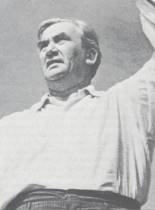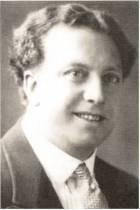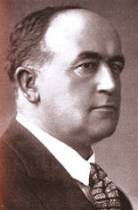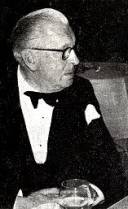
Albert Coates (April 23, 1882 – December 11, 1953) was an Anglo-Russian conductor and composer.

Walter Widdop (1892 - 1949) was born in Norland, near Halifax (Yorkshire), and left school at 12 to work at the local woolen mill. He joined the local church choir, singing in a variety of oratorio works. When the war came in 1914 he joined the army, and despite his good voice it was not until 1922 that he started to think about professional singing. Having once realized his talent, Widdop began his studies under Arthur Hinchcliffe and took further advice from the famous British bass Norman Allin. After short studies with the baritone Dinh Gilly he debuted as Radames in 1923 at the British National Opera in Leeds, to be followed by singing Samson. The next year Covent Garden saw him as Siegfried and he was immediately recognized as a notable "Heldentenor”. His repertory included Siegfried, Siegmund, Tristan, Tannhäuser, Samson and Renaud in Gluck’s Armide. He created Bagoas in Goossens’ Judith. In 1936 Widdop sang the title role in the British premiere of Stravinsky’s Oedipus Rex, in a concert performance under Ernest Ansermet. What followed was a successful career, yet not so successful as it should have been. He sang opera in Spain, oratorio in Holland and songs in America, but the career remained limited and more or less homebound. The public admired him in Wagnerian parts, but he was also an excellent oratorio singer. In Gluck’s Armide (1928) a critic described his acting as "sincere but a little too restrained”. Other critics wrote: ”Walter Widdop is worlds better than any visiting German tenor since the war, and yet we have to put up with imported Teutons who turn our thoughts to murder” and "There are two hundred opera houses in Germany to whom Widdop would be a godsend... It is waste in an era of famine for a singer with his material and skill to go round the country year after year singing in Messiah when he could be singing Lohengrin, Tannhäuser, Siegfried and Parsifal. After two years routine on the German stage he would be one of the four leading heroic tenors in Europe”. Widdop’s last engagement in London took place in 1949, when he sang Lohengrin’s Farewell under Sir Adrian Boult at the Royal Albert Hall. He collapsed in his dressing-room immediately after the performance and died the next day. 
Robert Radford (13 May 1874, Nottingham – 3 March 1933, London) was a British bass singer who made his career entirely in Britain, becoming one of the foremost singers of oratorio and concert work and equally having great success in a wide range of operatic roles from Wagner to Gilbert and Sullivan. Even as a very young man Radford had a deep and resonant voice. He studied at the Royal Academy of Music in London, mainly under the conductor Alberto Randegger, but also received lessons from Battison Haynes and Frederick King. He had natural dramatic gifts which from the outset suggested an operatic career, but his early professional life was devoted particularly to oratorio and the concert platform. Robert Radford made his operatic debut at Covent Garden in London in 1904 as the Commendatore in Don Giovanni. In 1908 he sang Hagen and Hunding in the first English Ring Cycle under Hans Richter in London. He created Abbott Tunstall in Angelus (Naylor). In 1921 he became a founder, with Thomas Beecham, of the British National Opera Company. Later he became its director. In 1920-22 he became a founder Director of the British National Opera Company, and also became an important member of its singing company. He sang in two Philharmonic Society performances of Beethoven's 9th Symphony, first under Felix Weingartner in March 1924 with Florence Austral, Margaret Balfour and Frank Titterton, and again in October 1925 with Dorothy Silk, Muriel Brunskill and Walter Widdop, under Albert Coates. He continued to make recordings for HMV after the advent of the electric microphone in 1925. In late acoustic and early electric sets of Wagnerian passages, he is heard at some length (often opposite Florence Austral) as Alberich in Das Rheingold, Wotan in Die Walküre, and Hagen in Götterdämmerung, as Gurnemanz in Parsifal (HMV D 1025-29) and as both Hans Sachs and Pogner in Die Meistersinger, all under the baton of Albert Coates: the recorded sound is mostly disappointing. In 1929 Robert Radford was appointed to the faculty of his alma mater. His fame as an opera singer was great in England. In addition to singing opera, he greatly distinguished himself as a concert artist. His daughter, Winifred Radford (1901-1993), who had studied with him, became a singer and teacher. She was closely associated with Pierre Bernac and Francis Poulenc. 
George Baker (10 February 1885 – 8 January 1976) was an English singer. He is remembered for singing on thousands of gramophone records in a career that spanned 53 years, beginning in 1909. He is especially associated with the comic baritone roles in recordings of the Gilbert & Sullivan operas. George Baker, also known as George Portland (and other recording pseudonyms), was born in Birkenhead. He studied violin, flute and piano as a child. At the age of 16, he served as organist and choirmaster at the Woodford Parish Church in Cheshire. He did the same at two churches in Birkenhead between 1903 and 1906. Baker studied singing with John Acton and won a scholarship to the Royal College of Music. There he studied with Gustav Garcia and was awarded a Patron Funds Grant to continue his vocal studies in Milan in 1914. He was married twice: first to singer Kathlyn Hilliard, who died in 1933, and then to Olive Groves, another singer and teacher, who died in 1974. Baker first recorded for Pathé Records in 1909, while still a student. The change from cylinders to gramophone discs had just been made, and Baker was one of the earliest singers recorded on the new medium. In 1934 he recalled the experience as follows: We worked really hard in those days, for one song had to be sung perfectly at least six times. The records thus made would be played back again and further records made from them. The conditions under which we recorded were crude in the extreme. We sang in a tiny bare room and into a big tin trumpet, which was connected direct to the recording needle by a rubber tube. We sang collarless and in shirt sleeves, for the place quickly grew stifling. When electrical recording came in, this was all changed, and we now sing into microphones in beautiful rooms, not unlike broadcasting studios.
Baker recorded roles in the first British recordings of Parsifal by Richard Wagner, Hiawatha by Samuel Coleridge-Taylor, Salome by Richard Strauss and the Ninth Symphony by Beethoven's. He recorded in a wide range of repertory, including as "Uncle George" in a popular early series of children's recordings, in dance band records, hymns, and in the once popular recording of The Departure of a Troopship. In the 1920s, Baker performed with both the Carl Rosa and British National Opera companies. He also toured Australia for J. C. Williamson Ltd. in 1922-23, playing the roles of Lord Harry Coe in the musical revue The Peep Show, Hon. Andre d'Aubigny in The Lilac Domino and Blair Farquar in Sally (musical). During this tour, Baker made several recordings for the Aeolian Company. In later years, however, he rarely appeared on stage, and he only appeared professionally on stage in one Gilbert and Sullivan opera, at the Royal Festival Hall in a performance of Trial by Jury when he was 81 years old. Baker never performed on stage with the D'Oyly Carte Opera Company, but he recorded many of the Gilbert and Sullivan operas with that company and others and was known for his excellent diction, which is crucial in their rapid-fire patter songs. He sang in the first complete recording of The Mikado (1917) and subsequently recorded a role (and sometimes more than one role) in nearly all of the G&S operas, most of them at least twice, into the 1960s. He described the recording process in the early years as follows: "The first time we recorded the operas was in the days of the old tin trumpet, and principals joined in all the chorus-singing. When it came to our turn to sing in concerted numbers, we elbowed our way through the other singers to get to the trumpet in time." Baker made his final recording as a singer in December 1962, in Gilbert and Sullivan's Ruddigore, a few weeks before his 78th birthday.
Baker was also in demand as an administrator. He served as the BBC's Overseas Music Director from 1944 to 1947 and spent thirty years as committee member, treasurer and chairman of the Royal Philharmonic Society. He was also the long-standing Honorary Secretary, and a trustee, of the Savage Club (which earlier counted among its notable members W. S. Gilbert and George Grossmith). He also served as Secretary of the Orchestral Employers' Association and for the Musicians' Benevolent Fund as a member of the committee. Richard Wagner: Parsifal (excerpts)
Act 1 - Prelude, Transformation & Grail scenes. Act 2 - Klingsor's magic garden and Flower Maiden's scene. Act 3 - Good Friday Music.
Parsifal - Walter Widdop
Gurnemanz - Robert Radford
Titurel - George Baker
Symphony Orchestra
Conductor: Albert Coates
Rec.: 28,29,31.06.1925
|

